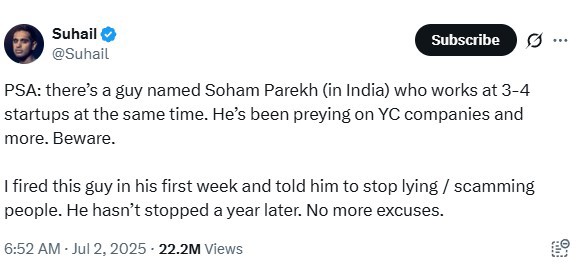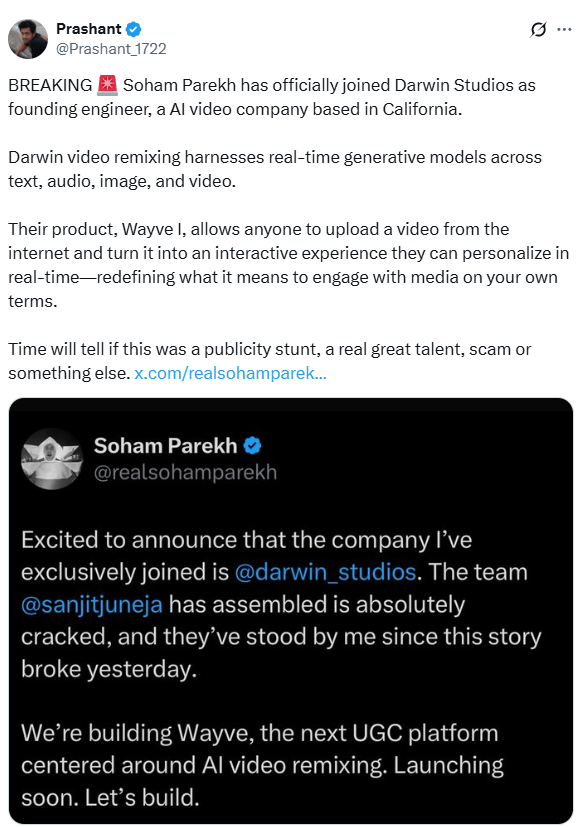On July 2, 2025, Mixpanel and Playground-AI founder Suhail Doshi posted a bold public warning on Twitter. He cautioned other founders about "a guy named Soham Parekh" who was allegedly working three or four full-time jobs at once, collecting hefty paychecks while delivering little to no code. Doshi had fired Parekh just a week after hiring him, but months later, upon realizing the deception was ongoing, he decided to expose him publicly.

Almost immediately, other startup leaders joined the thread with "me too" stories. Founders from Lindy, Fleet AI, Antimetal, and other companies shared that they had also hired, and quickly fired, the same engineer. What seemed like an isolated warning turned out to be a pattern: Parekh was jumping from one AI startup to another, racking up salaries that could have totaled over a million dollars a year.
Table of Contents
Within twenty-four hours, #SohamGate was trending. Engineers compared notes, founders exchanged Slack screenshots, and memes flooded timelines.
Too Good to Be True
How was a developer able to pass so many interviews?
According to all accounts, Soham Parekh interviewed like a 10x engineer: flawless resume, perfect technical coding test, and a charismatic product pitch. Several CEOs later admitted they were "blown away" during the selection process.
One of these companies was Lindy; Parekh nailed the interview but had a net negative impact within two weeks on the job. At another startup, the founders saw he logged about 3 total hours his first week. Excuses for his lack of productivity varied, from sudden illnesses to claims that a military drone strike had damaged his house (India-Pakistan conflict, this was a lie).
The biggest clue came when two YC founders compared notes and discovered that the same engineer was "on sick leave" at one company while merging code at another. When IP logs showed Parekh connecting from Mumbai (not California, as he'd claimed), and a work laptop sent to a fake US address was returned, the deception was undeniable.
Warning Signs and Revelations
Doshi's public tweet set off a domino effect:
- Pragmatic Engineer published a detailed case study: The 10x Overemployed Engineer, tracking at least 20 startups linked to Parekh.
- Parekh himself gave a confessional interview, admitting that he had been juggling several jobs since 2022 and sometimes worked 140-hour weeks out of "financial desperation."
Curiously, amidst the backlash, a few contrarians offered Parekh a second chance. San Francisco-based Darwin Studios announced it would hire him as a founding engineer, claiming that a public reputation to repair is the best productivity incentive.

NOTE: I've found tweets and news articles stating that this is true, but I haven't seen any statement directly from darwin_studios.
The Tech World's Reaction
Inside our world, reactions varied widely.
- Founders: Furious over the broken trust, many promised stricter reference checks, regular in-person onboarding, and a trust-but-verify approach to supervising remote staff.
- Engineers: Divided opinions. Some called Parekh a fraud harming their community; others saw him as the counterbalance to companies doing outsourcing, these companies take advantage of low costs in certain countries, and in this case, someone from those countries took advantage of them.
- The internet at large: Worried that cases like this could be used as ammo to enforce return-to-office mandates or intrusive surveillance. And, of course, the memes.
A Warning for Remote Work
The Soham Parekh saga is an unusual case, but it crystallizes three uncomfortable truths:
- Trust is fragile. Remote work lives or dies by good faith. When one bad actor abuses that trust, entire cohorts of honest remote workers suffer reputational fallout.
- Speedy hiring has hidden costs. In the AI talent race, startups often skip deep reference or background checks. Parekh exploited exactly that.
- 10x Developers. Tech culture loves the "10x productivity" mythos, but the pressure to appear superhuman can incentivize shortcuts, sometimes with catastrophic results.
Don't panic. Remote work is still mostly successful; most employees are honest, and most companies benefit from distributed teams. But the industry needs to toughen up assessment, encourage transparency about outside commitments, and remember that integrity always beats opportunists in the end.

